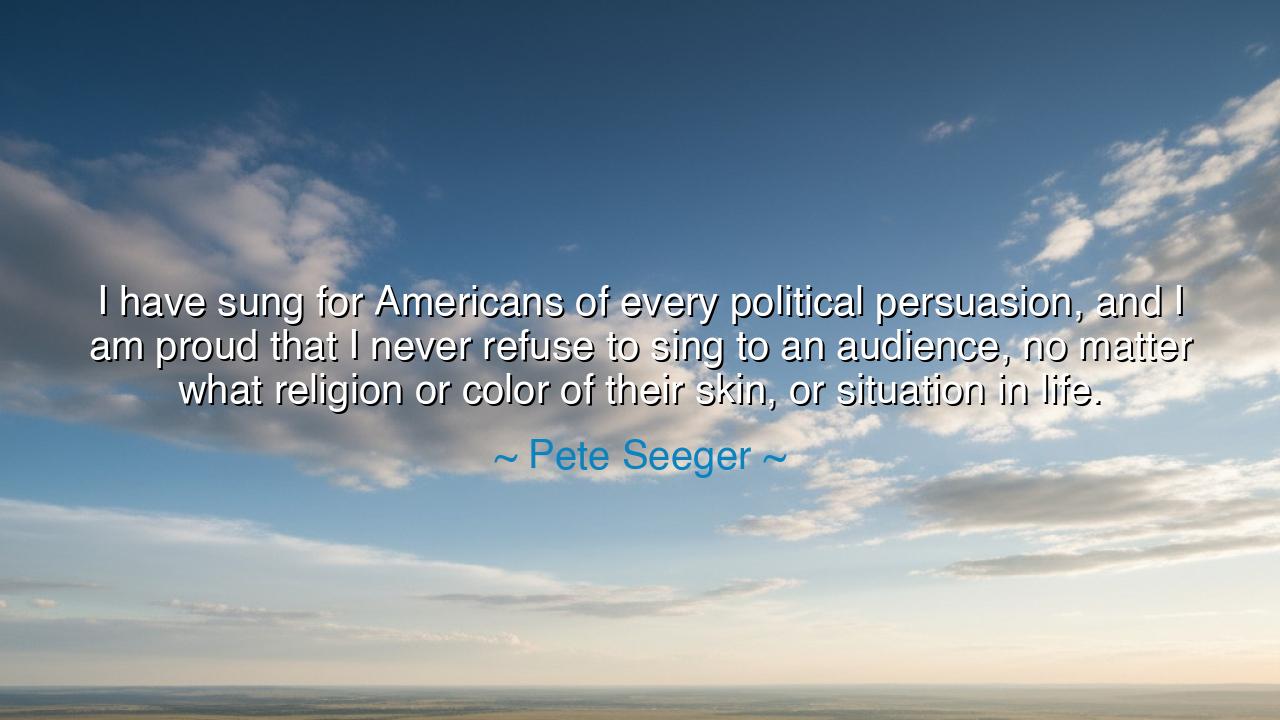
I have sung for Americans of every political persuasion, and I am
I have sung for Americans of every political persuasion, and I am proud that I never refuse to sing to an audience, no matter what religion or color of their skin, or situation in life.






The words of Pete Seeger—“I have sung for Americans of every political persuasion, and I am proud that I never refuse to sing to an audience, no matter what religion or color of their skin, or situation in life.”—resound like the song of a prophet who chose unity over division, and service over pride. They remind us that the gift of art, like the gift of love, is not meant for a chosen few, but for all who hunger for it. His voice was not bound by walls of politics, religion, or race, but soared freely, touching every ear willing to hear. In this, Seeger embodied a truth older than kings: that music has the power to heal divisions and remind men of their shared humanity.
The origin of this declaration lies in Seeger’s long life as a folk singer, activist, and troubadour of the people. He sang in times of war and times of peace, in fields and on stages, in union halls and in concert halls. He lifted his voice for the poor and for the powerful, for those who agreed with him and for those who did not. For him, music was not a weapon of exclusion but a bridge. By declaring he “never refuse[d] to sing,” he revealed his conviction that his duty was not to judge an audience but to serve it—reminding them through song that no matter their situation in life, they were worthy of dignity, joy, and truth.
History itself shows us the strength of such a philosophy. Think of Paul Robeson, another singer who poured his voice across boundaries of race and nation. He sang spirituals that carried the sorrow and hope of his people, yet he offered them to all, even those who did not share his struggles. Like Seeger, Robeson understood that the human voice, lifted in song, can soften hearts that no argument can reach. Their courage teaches us that to share art and truth with all people is to sow seeds of unity even in fields of division.
There is also heroism in Seeger’s defiance of division during times of conflict. In the height of America’s Red Scare, when suspicion and political hatred ran deep, he was blacklisted and scorned. Yet he continued to sing—not only for those who supported him, but for those who might despise him. By doing so, he demonstrated that to love humanity through song is to transcend bitterness. He showed that true conviction is not to narrow the gift of art to the like-minded, but to keep offering it even when it is rejected.
The heart of his words lies in humility. Too often men and women use their gifts as currency, choosing when and where to spend them. But Seeger gave freely, refusing to let political persuasion, skin color, or creed dictate who was worthy. His pride was not in fame, but in service. To him, the refusal to exclude was itself a triumph, for in the act of singing for all, he affirmed the truth that all are equal and all are human.
The lesson for us is eternal: do not let the barriers of prejudice dictate the use of your gifts. Whatever talents or strengths you hold—whether in voice, in art, in teaching, or in labor—offer them widely, not only to those who agree with you or resemble you, but to all who stand before you. For it is in giving without exclusion that you reveal the nobility of your soul. As Seeger’s life showed, one song sung to all carries more power than a thousand sung only to the chosen few.
Practically, this means breaking down the walls of division in our daily lives. It means greeting the stranger with the same kindness you show a friend. It means sharing your skills, your compassion, and your encouragement across the lines of politics, religion, and race. And it means remembering that your worth is not measured by who you exclude, but by how far your embrace extends.
Thus, Pete Seeger’s words ring like a hymn for generations: never refuse to sing, never refuse to serve, never refuse to love. For when we give freely, without boundary or condition, we become not only artists or workers, but healers of the human spirit. And in that giving, we leave behind a song that echoes long after our voices are silent.






AAdministratorAdministrator
Welcome, honored guests. Please leave a comment, we will respond soon